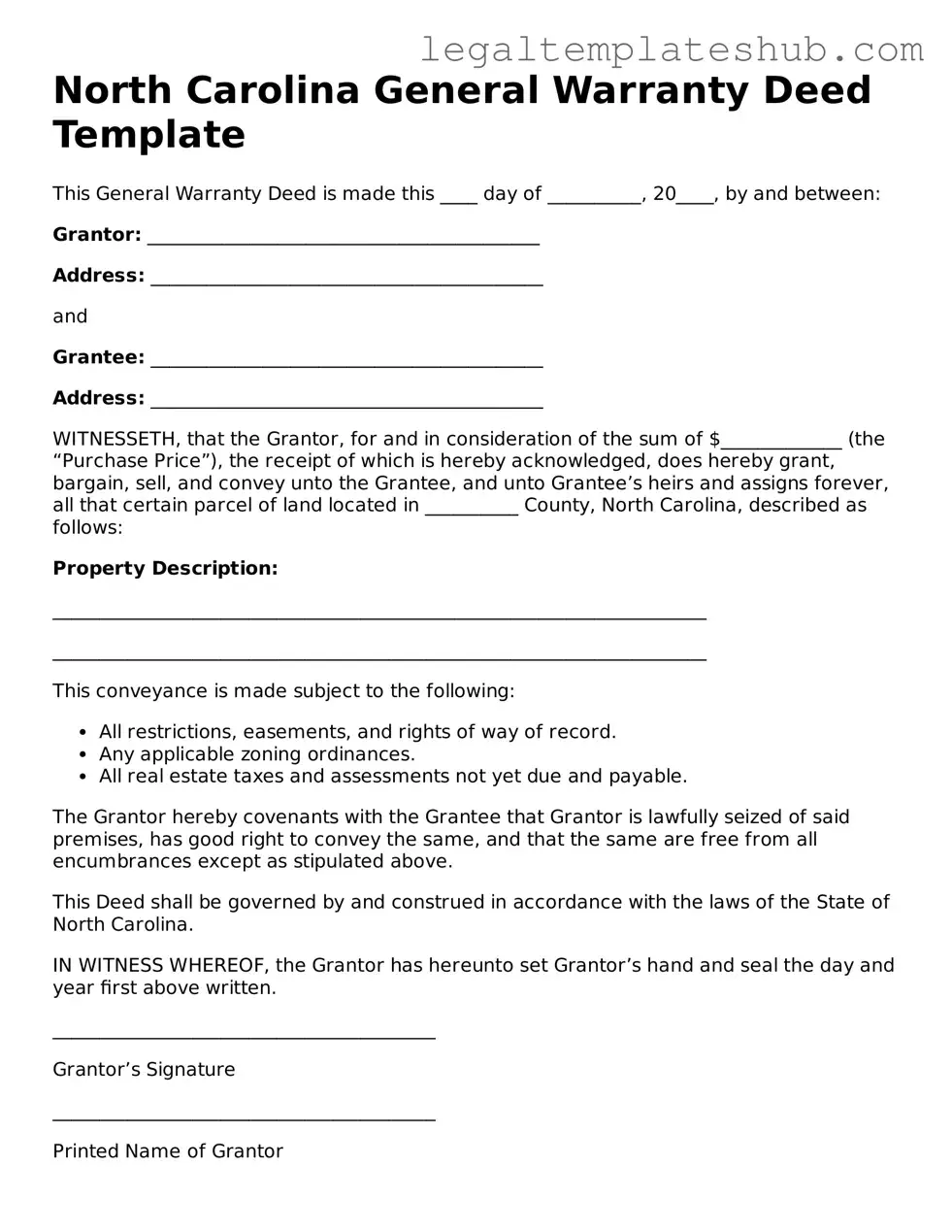Printable Deed Document for North Carolina
PDF Form Data
| Fact Name | Description |
|---|---|
| Purpose of the Deed | The North Carolina Deed form is used to transfer ownership of real property from one party to another. |
| Types of Deeds | Common types include General Warranty Deed, Special Warranty Deed, and Quitclaim Deed. |
| Governing Laws | The deed form is governed by North Carolina General Statutes, particularly Chapter 47. |
| Signature Requirements | The deed must be signed by the grantor and may require notarization for it to be legally binding. |
| Recording the Deed | Once completed, the deed should be recorded at the local county register of deeds to provide public notice of the ownership transfer. |
Key takeaways
When filling out and using the North Carolina Deed form, consider the following key takeaways:
- Ensure all parties involved are clearly identified. This includes the grantor (seller) and grantee (buyer).
- Provide a complete legal description of the property. This description should be accurate and match public records.
- Include the date of the transaction. This is essential for record-keeping and legal purposes.
- Sign the deed in the presence of a notary public. Notarization is required for the deed to be valid.
- File the completed deed with the appropriate county register of deeds. This step is crucial for public record.
- Keep a copy of the filed deed for personal records. This serves as proof of ownership.
Dos and Don'ts
When filling out the North Carolina Deed form, it is essential to approach the task with care and attention to detail. Here are some important do's and don'ts to consider:
- Do double-check the names of all parties involved. Ensure that they are spelled correctly and match legal documents.
- Don't leave any fields blank. Each section of the form must be completed to avoid delays or rejections.
- Do provide a clear and accurate description of the property. This includes the address and any relevant legal descriptions.
- Don't use abbreviations or shorthand. Clarity is key, so write out all terms fully.
- Do sign the deed in the presence of a notary public. This step is crucial for the document's validity.
- Don't forget to file the completed deed with the appropriate county office. Failing to do so can lead to issues with property ownership.
By following these guidelines, you can help ensure that your deed is completed correctly and efficiently. Taking the time to be thorough can save you from potential complications in the future.
More Deed State Templates
Clark County Register of Deeds - Property disclosures can be included in a deed to inform buyers of existing issues or potential liabilities.
For those looking to obtain a New York Motorcycle Bill of Sale, you can access a variety of customizable options through PDF Templates that will assist you in completing the necessary paperwork with ease and precision.
What Does a House Deed Look Like in Ohio - Parties involved in a deed must be of legal age and sound mind.
Instructions on Filling in North Carolina Deed
Once you have the North Carolina Deed form ready, it’s time to fill it out carefully. Ensure that all information is accurate and complete. This will help avoid any issues later on in the process.
- Begin by entering the date at the top of the form. This is the date when the deed is being executed.
- Next, provide the name of the grantor, which is the person or entity transferring the property. Include their address as well.
- List the name of the grantee, the individual or entity receiving the property, along with their address.
- Describe the property being transferred. Include details such as the street address, county, and any relevant parcel identification numbers.
- Specify the consideration, which is the amount paid for the property or a statement indicating that it is a gift.
- Include any additional terms or conditions that may apply to the transfer, if necessary.
- Sign the form in the designated area. The grantor must sign in the presence of a notary public.
- Have the signature notarized. The notary will complete their section, verifying the identity of the grantor.
- Finally, submit the completed deed to the appropriate county office for recording. This step is crucial to ensure the deed is legally recognized.
Misconceptions
Understanding the North Carolina Deed form is essential for anyone involved in property transactions in the state. However, several misconceptions can lead to confusion. Below are four common misconceptions and clarifications for each.
-
The North Carolina Deed form is the same for all types of property transactions.
This is incorrect. Different types of property transactions, such as residential, commercial, or agricultural, may require specific deed forms. Using the appropriate form ensures compliance with state laws and protects the interests of all parties involved.
-
Only licensed attorneys can prepare a North Carolina Deed form.
While it is advisable to seek legal assistance, especially for complex transactions, individuals can prepare their own deeds. However, they must ensure that the form complies with state requirements and includes all necessary information to be valid.
-
Once a deed is signed, it cannot be changed.
This misconception overlooks the possibility of amending or revoking a deed. If parties agree, a deed can be modified or replaced with a new one. It is important to follow the correct legal procedures to ensure that any changes are enforceable.
-
A North Carolina Deed form does not need to be recorded to be valid.
While a deed may be valid between the parties upon signing, recording it with the county register of deeds provides public notice and protects the interests of the grantee. Failure to record can lead to disputes and complications in ownership claims.
